Postpublished at 09:52 BST 4 August 2014
Nigel Farage, leader of UKIP
Take time today to contemplate the sacrifice of those people that gave their lives to keep this country free.
Monday 4 August 2014 marked the 100th anniversary of the start of Britain's involvement in WW1
About 17m soldiers and civilians worldwide were killed between 1914 and 1918
Royal Family members and world leaders attended commemorative events in the UK and elsewhere
An international ceremony of reconciliation was held outside the Belgian city of Mons
The day's events ended with a candle-lit vigil at Westminster Abbey and "lights out" events around the UK
Tom Moseley, Patrick Evans, Dhruti Shah, Anna Jones, Claire Bates, Nick Eardley, Kerry Alexandra, Kate McGeown and Gerry Holt
Nigel Farage, leader of UKIP
Take time today to contemplate the sacrifice of those people that gave their lives to keep this country free.
 News from 1914
News from 1914
The world on the brink of war
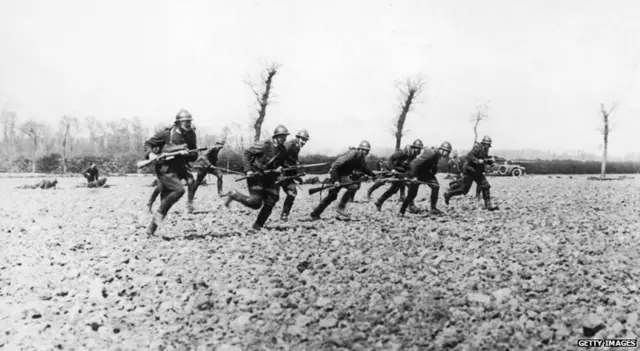 Image source, Getty Images
Image source, Getty ImagesBelgian soldiers charge
Battle of Liege
On 5 August 1914 the fighting started in earnest in Liege. The German soldiers crossed the Belgium border and attacked the city.
Liege was seen as the most fortified spot in Europe it was defended on all sides by 12 heavily armed forts. Though outnumbered; the Belgium soldiers inflicted heavily losses on the German troops.
The battle carried on for 12 days. After heavy shelling, the forts fell and the German army was victorious.
Two events are about to get under way. In Liege, dignitaries are taking their seats. The service at Glasgow Cathedral is also due to start at 10:00.
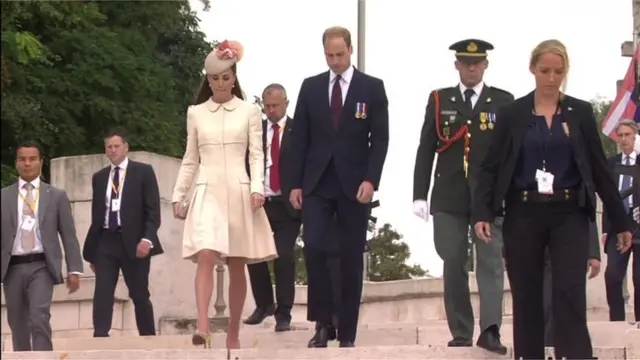
The Duke and Duchess of Cambridge arrive at the memorial in Liege.
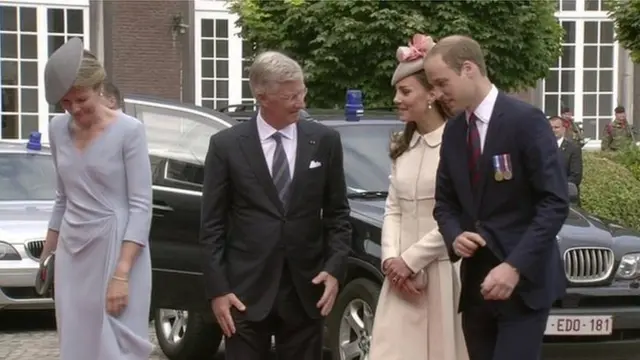
In the next few minutes, we're expecting more foreign leaders and dignitaries to arrive at the main memorial in Liege for a service hosted by the Belgian royal family from 10:00. Also from 10:00, Glasgow Cathedral will host the first main British service of the day.
Lilian Howells texts: My grandfather was shot in the eye and out through his ear and was on the Somme for five days and was still alive. It was crossfire by British bullets.
RJ Nash emails: My great uncle was cannon fodder at the Somme. His name is on the addendum tablet at the Menin Gate in Ypres, Belgium. His brother was badly wounded earlier in the war and according to his daughter was a shattered man; he died aged 50. I hope the focus will be on the shattered lives of the people left at home; wives and children. A large number of men were unable to cope on return and families left to fend for themselves. Was there really 'a home fit for heroes'?
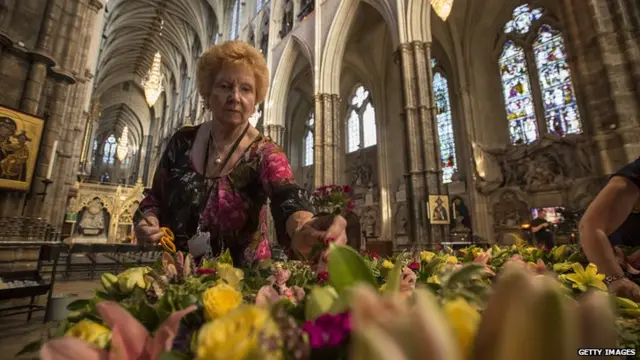 Image source, Getty Images
Image source, Getty ImagesFinal preparations are taking place ahead of tonight's ceremony at Westminster Abbey. Here, the Grave of the Unknown Warrior is covered in flowers.
Imelda Flattery
BBC News

Poppy umbrellas in Liege as we await the arrival of the Duke and Duchess of Cambridge.
James Buchanan
News Editor, First World War Centenary
.jpg.webp)
The memorial at Casteau outside Mons this morning marking the spot where British soldiers first engaged the Germans in the First World War. The first shots were exchanged and the first cavalry charge occurred as British troops met the Germans for the for the first time.
Andy Wright tweets, external: Remembering my Great Uncle, ADJ Melliss, who died at Railway Wood, Ypres, on 17th October 1915, aged 18.
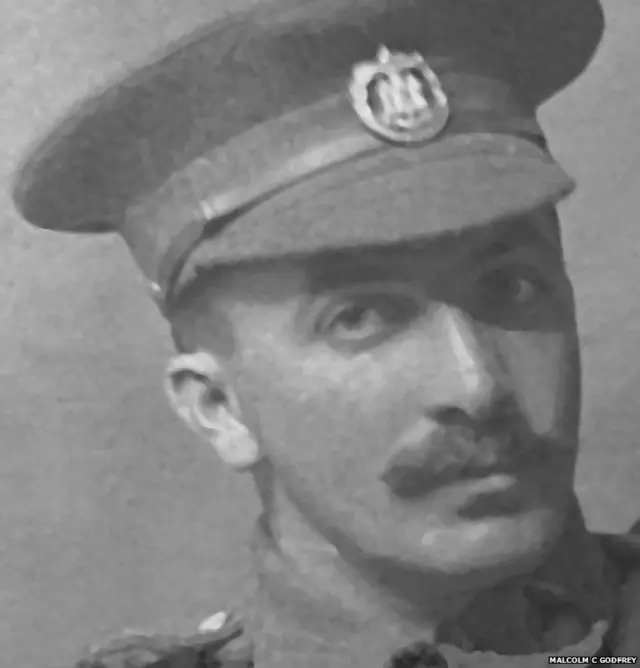 Image source, Malcolm C Godfrey
Image source, Malcolm C GodfreyMalcolm Godfrey emails: I will remember my Grandfather Sgt Charles Henry Godfrey of the 7th Northamptonshire Regiment. He served throughout the war from start to finish was wounded at least twice, was awarded the military medal for leading the capture of a German trench was taken prisoner of war in 1918 and was held at Crossen POW camp in Poland. He was finally released and repatriated in December 1918. He never talked about the war until the day he gave me his medals not long before his death at the age of 92 - a real silent hero.
Jon emails: I won't be commemorating the war because it should be something the Royal family and politicians should be apologising for as it was just another show of might by the British colonial masters. Especially after your report where it states no one knows why it really started. Biggest load of cobblers I have ever heard. My heart goes out to families who lost loved ones on a lie, just like Iraq and Afghanistan now. People need to wake up and realise not everything Britain does or is doing is great.
James Buchanan
News Editor, First World War Centenary
.jpg.webp)
St Symphorien Cemetery near Mons where this evening the Duke and Duchess of Cambridge will host a ceremony of reconciliation. Readings in English and German, music and moments of reflection at the place where Commonwealth and German soldiers from the Battle of Mons lie at peace together.
 News from 1914
News from 1914
The world on the brink of war
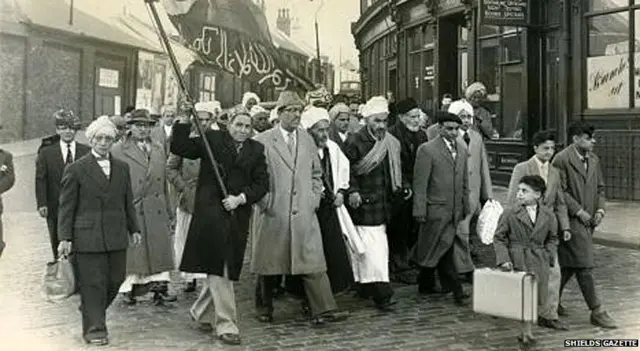 Image source, Shields Gazette
Image source, Shields GazetteMembers of the Yemeni community of South Shields
The Yemenis of South Shields
As war broke out, British seamen headed abroad to fight. One place that was affected by this was South Shields in the north east of England.
Hundreds of Yemeni sailors arrived and worked principally on the merchant ships. Many of them lost their lives. This was one of Britain's first Muslim communities and numbered around 3,000 by the end of the war.
The leader of the Labour Party Ed Miliband tweets, external: Today we remember the soldiers who gave their lives fighting for freedom in the First World War.
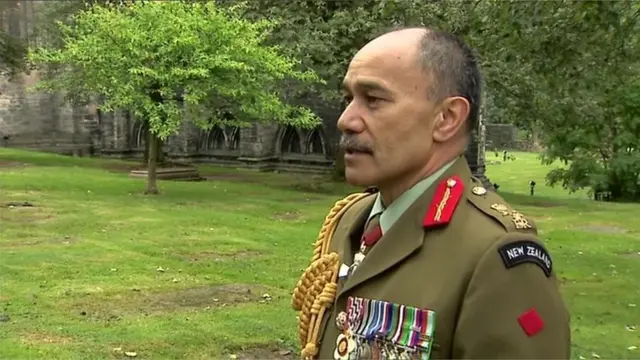
Governor-General of New Zealand Jerry Mateparae is in Glasgow for this morning's service. He tells the BBC News Channel the conflict had a "devastating" impact on communities throughout his country.
Just a reminder that the Belgian City of Liege is hosting one of the main commemoration events for the 100th anniversary of the outbreak of war. Representatives from around 50 countries, including numerous heads of state, are taking part in the event at the city's Cointe Memorial.
 News from 1914
News from 1914
The world on the brink of war
"When the crisis which has blackened Europe began, there was surely no sane man in Britain who desired war with Germany." The Liverpool Echo, 4 August 1914
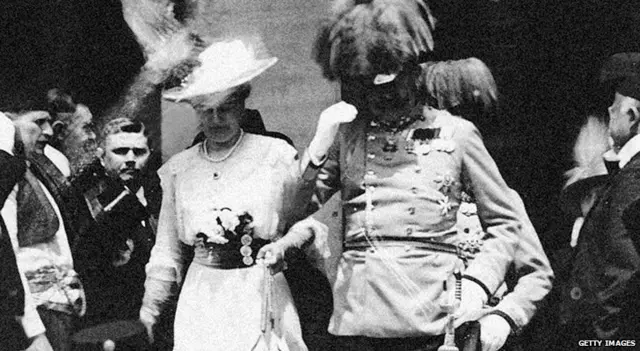 Image source, Getty Images
Image source, Getty ImagesArchduke Franz Ferdinand arrives in Sarajevo
The road to war
The assassination of Archduke Franz Ferdinand, heir to the throne of the Austro-Hungarian Empire, on 28 June 1914 set into motion a chain of events that led to World War One. The European nations were bound to one another by treaties and alliances. The archduke's death brought simmering animosities to the boil.